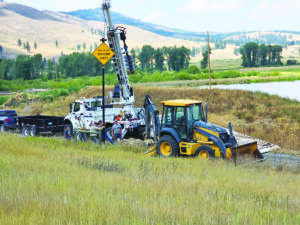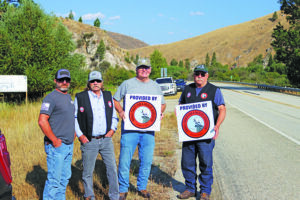
by John Dowd
Last week, the Ravalli County Fish and Wildlife Association (RCFWA) finally put up two of four signs they purchased over a year ago. The goal of the signs is to make drivers in mountainous country aware that they are entering Bighorn sheep country. According to Fred Upchurch and Mark Oswald, members of the organization, sheep are not the same as the ubiquitous whitetail deer.
“We would like to get the word out on how valuable these dang things are,” said Upchurch, an RCFWA board member. “They’re not the same as whitetail.” According to Oswald and Upchurch, if a person is caught poaching one of these sheep, it can cost over $30,000 in restitution fees.
Part of the reason Bighorn sheep are so valuable is the money they bring into the economy. Not only do some people wait years and pay thousands over the years for scouting and the big hunt, but these tags are not easy to come by. According to the two men with RCFWA, the Wild Sheep Foundation auctions off a special tag every year, called a “Governor’s tag,” which can easily go for half a million dollars. The majority of that money goes back into the state and into conservation.

Oswald, president of the RCFWA, said these sheep are not like deer, which he thinks many people seem to believe. Bighorns do not propagate as well as deer and elk, and are subject to many diseases which are often transmitted by domestic sheep and goats. In fact, both men spoke of a die-off that has been occurring on Skalkaho Pass. According to Oswald, they lost at least five in a little over a week.
“All it takes is rubbing noses and one brings it back,” said Upchurch. This, “typhoid Mary,” as Oswald referred to the carrier of the new disease, can cause the death of an entire herd. Another issue that faces sheep in particular is road crossing in their mountainous terrain. The sheep come down, particularly in winter, to lick the salt from the roads. They also come down low during the winter to feed. The flat ground of roadways are great places for sheep to get off steep terrain, making them particularly susceptible to being hit.
In order to combat the loss of sheep due to traffic collisions, the RCFWA worked to purchase four large flashing signs to install. Two will eventually be installed on Skalkaho Pass. Last week, they installed two south of Sula, where a number of sheep have been hit, including one the night before they put up the signs. These signs are solar powered, with flashing lights for easier visibility. They are also placed on tall poles to be easily seen even under snow or when placed far off a road shoulder.
“We’re trying to get people to become aware of sheep on the highway,” said Oswald. According to him, each sign cost the organization over $1,200. RCFWA had the posts powder coated locally and are working with Ravalli Electric Co-op to put up the signs. The organization needs the Co-op’s help to dig the eight foot holes needed to anchor some of the signs that have 24-foot posts.
The RCFWA has also worked with land owners to put the signs on private land to get them up quickly. Prior to the organization’s efforts to put up the signs, there was very little signage about the sheep on that stretch. Since purchasing the signage over a year ago, the state did put up a few signs as well. According to the group, the more signing the better. However, they hope their signs will be more visible than the ones provided by the state.
When asked about why they would go through such a monumental effort just to put up a few signs, Oswald said, “We’re sportsmen.” Upchurch added, “We protect wildlife and the habitats they live in.” Both men explained that everything they do is in close work with local biologists and game wardens. Another board member in attendance during the sign installation was Jerry Walker, who said, “Hopefully, the kids are taking note of what we are doing and are going to take it on after us.”